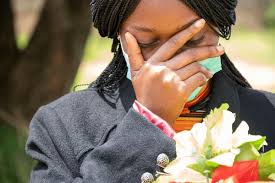IT has been noted that environmental crimes contributing to climate change have been committed on local and global scale, but the perpetrators have always managed to get away with their sins. These sins usually have the blessing of the State or they have been committed by the State in the name of national and global development.
These crimes include the plastic menace, pollution, fossil fuel production, carbon emissions, carbon markets and carbon trading. There are also issues of loss and damage, climate revenge, carbon inequalities, deforestations, burning forests and wildfires, nuclear waste, lack of transparency, disinformation and miscommunication and lack of corporate sustainability reporting, among others.
No breakthrough has been realised regarding the issue of plastic menace. Plastic wares and materials continue to be manufactured at a grand scale for individual uses, domestic, national and global uses. The world has failed to manage and dispose plastic waste as thousands and millions of tonnes of plastic waste finds its way into water bodies, rivers, dams, lakes, seas, oceans and on land.
While some plastic materials can be recycled, repackaged and reused, the bulk have been collected, burnt and dumped into the seas and oceans endangering mariner lives. Some have been left lying around and have became part of livestock fodder, endangering their digestive systems. No strict laws have been gazetted that lead to the prosecution of people, organisations and companies which commit plastic crimes.
Awareness raising and campaigns have been conducted, but without change in behaviour. The world is trying to deal with carbon emissions without any success. Multinational companies continue to mine oil, gas and coal without taking note of the threat this has on the 1,5 degrees Celsius global benchmark to avoid a global catastrophe as per the United Nations Framework Convention on Climate Change Paris Agreement.
All these are climate sins of carbon emissions that have gone unchecked and unpunished, but have contributed to global warming, altering the composition of the atmosphere. The main polluting actors have used the resources at their disposal to engage in large scale disinformation, miscommunication, double-dealings and failure to walk the talk. They continue to invest in language use and abuse, through green talk (eco-trust, eco-faith, green living) to normalise their polluting crimes.
Investing in new linguistic order contribute to environmental glib just to leave the public in quandary. Nothing much has been done to condemn the large quantities of aviation fuels that are being used in such mega wars as between Russia and Ukraine; and between Israel and Palestine, all with global attention and support. This also includes fuels burn when major powers are engaged in military drills and maneuvers in seas and oceans, in the name of protecting their interests.
This has led to the dangers of used large quantities of fuels being underreported or not reported at all. There has been talk of the carbon calculator used to measure the amount carbon footprints for individuals, companies or organisations. This is not been widely used, unless otherwise on a voluntary basis. Under serious and normal situations, this is supposed to be the way to go for individuals and companies so that they develop a culture of carbon sustainability.
Communities have never been clear about carbon credits, markets and capture. These are false fraudulent solutions that have largely gone unpunished, especially when rich and polluting nations buy vast tracts of land in developing countries so that they continue polluting. By so doing, countries will be mortgaging their forests through trading in hot air while selling the people’s birth right to countries with no forests. This is criminal and fraudulent if it only makes sense to the State while it remains ambiguous from the citizens’ point of view.
The other aspect is carbon inequalities, where in the advent of renewable energy technologies polluting nations have not done much to reduce carbon emission gaps between developed and developing countries. Many African countries are still stuck chin-deep into energy poverty, through inadequate electricity generations, power cuts and false promises of abundant power supplies that never materialise.
Developing countries are also guilt of engaging in climate revenge, that because many rich and powerful nations built strong economies through investing in fossil fuels, they, therefore, also need to do the same. In this regard, developing countries are saying, they also want to enjoy the benefits of mining fossil fuels just like what many developed countries did.
The global demand for timber and furniture has contributed to massive deforestation in many developing countries, which has released lots of carbon into the atmosphere. In some countries, logging is threatening to strip countries of their vital forests through State-sanctioned proxy investments that are not of national, but individuals benefit.
Forest canopies are a vital component for absorbing carbon emissions, natural resources conservation, moisture retention and food security.
There are also deliberate attempts not to align sustainable development goals (SDGs) with national development frameworks to fully mainstream climate action. SDG13, climate action is not contributing to desired outcomes, both in decarbonisation and adaptation programmes.
Forest regeneration programmes are not clearly streamlined and mainstreamed to motivate individual communities to participate, independent of political grandstanding and machinations. Whenever a vital programme has been politicised, it signals its death sentence. Reforestation programmes need no distortions, hence they require diversifications, rather than monocultural practices.
It is also criminal for frontline communities like women, youth and children to be left exposed to the vagaries of climate change without cushioning them, yet using their plight to apply for climate funding.
These groups of people continue to fight the climate battles to survive without concrete interventions to sufficiently empower them.
There are also situations whereby many people are victims of lack of climate transparency and communication. Many communities lack detailed information on climate projects being implemented and the reasons they are supposed to participate in those programmes. They are not consulted, but lectured on and coerced.
On a global scale, projects designed in the Global North are ironically supposed to be implemented in the Global South, leading to the monetisation of nature, instead of maintaining traditional ecological governance of nature.
All the above are documented evidence of criminal or fraudulent practices, evident at national and international levels, have largely gone unpunished because of lack of strict and binding arresting laws. This has resulted in many governments being the first to break their own laws.
Peter Makwanya is a climate change communicator. He writes in his personal capacity and can be contacted on: [email protected]












